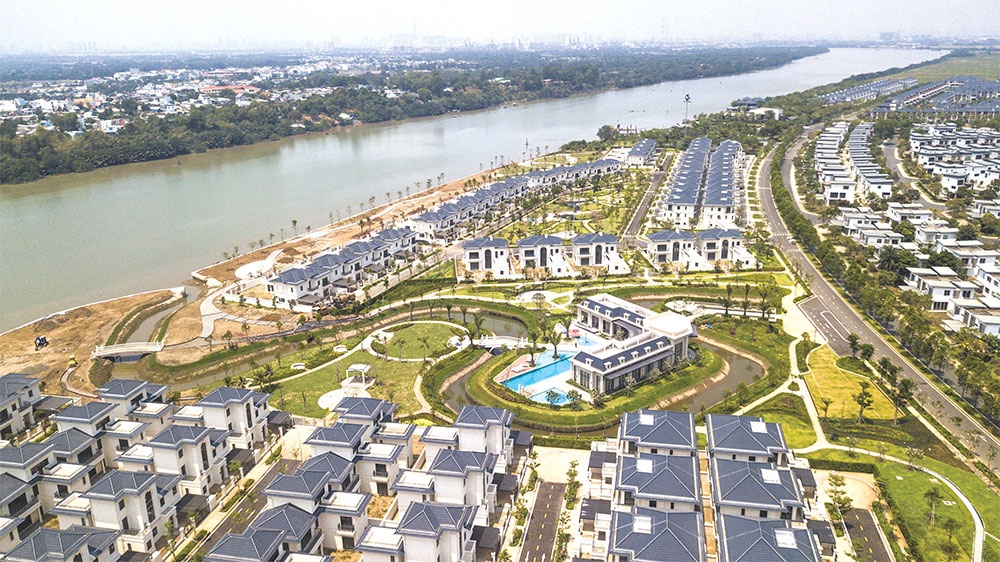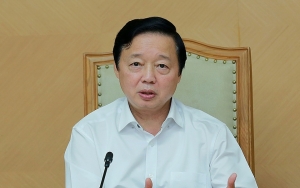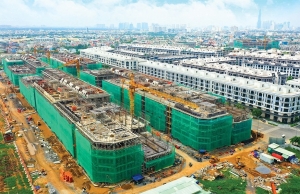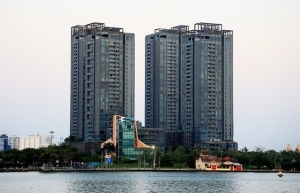Real estate sector still on back foot
 |
| Some major schemes have been dormant for several years for a myriad of reasons, photo Le Toan |
The prime minister on May 31 asked Minister of Construction Nguyen Thanh Nghi to work directly with Bui Thanh Nhon, chairman of the board at Novaland Group, to solve problems regarding its projects in the southern province of Dong Nai.
The previous month, deputy prime minister Tran Hong Ha assigned the Ministry of Construction to coordinate with the Ministry of Natural Resources and Environment to establish a working group with the people’s committees of Dong Nai and Binh Thuan provinces to solve Novaland’s issues in those localities.
In February, in a letter sent to the National Assembly Standing Committee (NASC), Nhon had told authorities at the beginning of the year that while Novaland boasted many key projects in Dong Nai, they were all stalled mainly due to planning adjustments.
According to Nhon, planning approval for the projects has been delayed for more than two years, leaving Novaland unable to carry out construction funding procedures. “This has been due to the inconsistency between the general planning of Bien Hoa city and the projects themselves. At the same time, the problem of arranging land for social housing construction is entangled due to inconsistent regulations,” Nhon said.
“The long delays lead to the risk of bankruptcy due to a lack of operating cash flow. Novaland urgently proposes the NASC to consider and direct authorities to urgently solve issues for these projects to help the company overcome this difficult period and avoid negative consequences,” Nhon said.
Novaland is not the only developer seeking support from authorities to continue their projects. Quoc Cuong Gia Lai has had six projects halted in the last three years due to overlapping regulations.
Him Lam Real Estate, meanwhile, is in its 20th year of being stuck with a residential project as part of Rach Chiec New Urban Area in Ho Chi Minh City. Funded by Real Estate No.10, the venture has been delayed due to issues with infrastructure, land clearance, and compensation.
On May 25, Prime Minister Pham Minh Chinh set up a working group to review and remove problems in the implementation of real estate projects.
The PM issued an official letter on the safe, healthy, and sustainable development of the real estate market, noting that in recent years, the market has faced many difficulties due to the pandemic, and the market was at the lowest cycle growth amid decreased economic growth.
Besides this, policy formulation, approval, adjustment, and project implementation was slow, causing difficulties in access to credit capital in the form of bonds and securities.
Some localities are not proactive in solving problems and coordinating with central agencies to do so, he added. Moreover, the market is not transparent enough, the structure of real estate products is not reasonable, and the laws confusing and unclear.
As a result, the PM has directed the State Bank of Vietnam to create stronger conditions for real estate project investors and home buyers to access credit.
On the same day, the Ministry of Natural Resources and Environment was issued to direct and guide localities to remove issues in determining land prices and setting annual land use plans, as well as compensation and site clearance.
The same ministry is also responsible for submitting a draft version to amend and supplement the decree on land prices and adjusting the land price, valuation and consultancy activities before June 30. At the same time, a series of localities are trying to erase difficulties and boost the property market, including Quang Nam, Can Tho, and Ho Chi Minh City.
Quang Nam People’s Committee, for example, has requested its local Department of Planning and Investment to review all real estate projects and define those that are facing problems. The department will work directly with each developer to clearly identify the causes and set prompt solutions to remove them.
The chairman of Can Tho People’s Committee assigned the Department of Construction to continue monitoring and managing 32 projects, proactively guiding and urging developers to accelerate project implementation and hand over infrastructure to localities to manage.
With more than 100 projects delayed, Ho Chi Minh City is being urged to be proactive in supporting developers to wipe out their problems. At a recent meeting between Ho Chi Minh City People’s Committee and developers of 116 projects last month, vice charman Bui Xuan Cuong said that the city would focus on reviews and making solutions as soon as possible.
The continuing work to try and help businesses comes just a few months after the government set up policies to review the situation, illustrating that much more needs to be carried out.
According to the statistics of Vietnam Real Estate Association, the property market in the first months of 2023 showed positive signals thanks to the support and timely removal of some problems by the government and local authorities.
“The government in March set up a working group to review the difficult situation of enterprises and localities whose projects are facing problems, and instructions to eliminate obstacles for the real estate sector have also been released,” Dinh said.
The key points offered at the time was to allow businesses that have issued bonds, but cannot pay in full or on time, to negotiate with the bondholder to pay the bond interest to maturity with other assets.
Second, the government permitted extending the bond’s term up to no more than two years compared to the term in the bond issuance plan committed to investors, and allowed a negotiation mechanism between bond issuers and investors to have feasible solutions.
Nguyen Anh Phong, dean of the Faculty of Finance and Banking at the University of Economics and Law in Ho Chi Minh City said, “These solutions take time but are on the way to being implemented, so we hope that the market will be more positive by the end of the year.”
 | $5 billion measure not to prop up real estate market In lieu of real estate aid, a $5 billion plan government plan seeks to develop at least one million social housing units. |
 | Second home real estate on the slow path to recovery The second home and resort real estate market is dragging through a slow recovery, with very few transactions in the first four months, although tourism numbers and new legislation are pointing in a healthy direction. |
 | Real estate living on borrowed time In the first five months of 2023, 554 realty firms went out of business, up 30.4 per cent year-on-year. Others became worse off as their revenue and profit fell by nearly 7 and 40 per cent, respectively. |
What the stars mean:
★ Poor ★ ★ Promising ★★★ Good ★★★★ Very good ★★★★★ Exceptional
Related Contents
Latest News
More News
- Construction firms poised for growth on public investment and capital market support (February 11, 2026 | 11:38)
- Mitsubishi acquires Thuan An 1 residential development from PDR (February 09, 2026 | 08:00)
- Frasers Property and GELEX Infrastructure propose new joint venture (February 07, 2026 | 15:00)
- Sun Group led consortium selected as investor for new urban area (February 06, 2026 | 15:20)
- Vietnam breaks into Top 10 countries and regions for LEED outside the US (February 05, 2026 | 17:56)
- Fairmont opens first Vietnam property in Hanoi (February 04, 2026 | 16:09)
- Real estate investment trusts pivotal for long-term success (February 02, 2026 | 11:09)
- Dong Nai experiences shifting expectations and new industrial cycle (January 28, 2026 | 09:00)
- An Phat 5 Industrial Park targets ESG-driven investors in Hai Phong (January 26, 2026 | 08:30)
- Decree opens incentives for green urban development (January 24, 2026 | 11:18)

 Tag:
Tag:




















 Mobile Version
Mobile Version